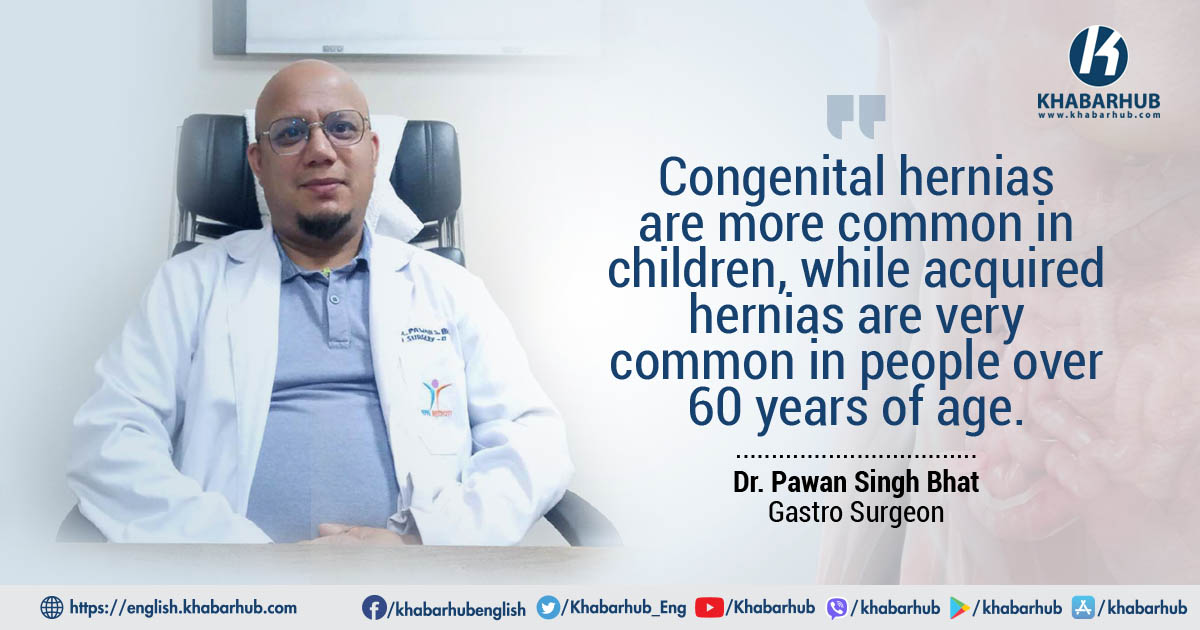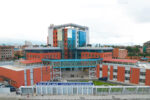KATHMANDU: Hernia is a medical condition characterized by the abnormal protrusion of an organ or tissue through a weak spot in the surrounding muscle or connective tissue.
This can occur in various parts of the body, but most commonly in the abdominal area.
While hernias can be entirely treatable, prompt intervention is crucial to avoid potentially life-threatening complications.
Dr. Pawan Singh Bhat, a gastro surgeon at Mediciti Hospital, emphasizes the importance of early treatment for hernias.
If left untreated, hernias can lead to severe health risks and even death.
Hernia is a condition where a part of the body pushes through a weak spot in the muscle or tissue.
Weakness in the muscle or connective tissue can lead to hernias, and this can be due to aging, congenital factors, or other health conditions.
If a hernia is not treated in time, it can cause pain, complications like strangulation, and even death.
Prevention includes maintaining a healthy weight, avoiding heavy lifting, and managing conditions that increase abdominal pressure.
A conversation with Dr. Bhat highlights the need for awareness about hernias and the importance of seeking timely medical treatment to avoid serious complications. Excerpts:
What kind of disease is hernia?
A hernia is a condition in which an internal organ protrudes through a hole in the muscle or tissue where it shouldn’t be. The herniated area can become swollen and may cause discomfort.
What causes this?
There are two main causes of hernias. The first is congenital hernias, which are present at birth. The second is acquired hernias, which occur later in life.
Muscle weakness can contribute to hernias, especially after surgery if the muscle is cut at the incision site.
Strenuous activities such as lifting heavy weights, obesity, and increased intra-abdominal pressure from straining can also lead to hernias.
Which part of the body is more prone to hernia?
Hernias can occur in different parts of the body:
Inguinal Hernia: It occurs in the abdominal region and is more common in men than in women.
Umbilical Hernia: This is an abdominal hernia where a part of the intestine protrudes through its membrane, often after abdominal surgery.
Epigastric Hernia: It is located between the navel and ribs.
Femoral Hernia: It occurs in the thigh and is more common in women.
Other types include lumbar, parastomal, incisional, hiatal, and others.
What are its symptoms?
Symptoms include swelling or a lump at the site of the hernia. The lump may recede when lying down and become more noticeable when standing up.
Why is hernia more common in men than women?
Hernias are more common in men due to the anatomical placement of the testicles and the additional strain from heavy lifting and manual labor.
This condition is less common in women, who are generally less prone to perform heavy tasks that increase intra-abdominal pressure.
What are the risks if there is no treatment in time?
If hernias are not treated promptly, the condition can worsen and lead to more severe health problems.
The hernia can grow larger and lead to complications such as the intestines becoming trapped, causing a blockage or strangulation.
This can lead to the intestine rupturing and becoming infected. In severe cases, the intestinal tissue may rot, requiring surgical removal.
This can also lead to blood infections like sepsis, which can be life-threatening.
Delaying treatment can complicate the situation and lead to more complex medical interventions.
What is the condition of hernia patients in Nepal?
Hernias are very common in Nepal due to the physical activity associated with agricultural work.
Many people experience this issue because of the demands of manual labor.
At what age is it more common?
Congenital hernias are more common in children, while acquired hernias are very common in people over 60 years of age.
What is its treatment method? Is surgery the only option or can it be cured with medication?
Surgery is the primary treatment for hernias. It is the only way to address the hole or weak spot causing the hernia.
In some cases, such as inoperable hernias in the chest, patients may be advised to use a hernia belt for support, though this is more a preventative measure than a cure.
What do we need to do to avoid this?
To avoid hernias, it’s important to avoid activities that put pressure on the abdomen.
Take regular breaks if standing for long periods and treat chronic illnesses promptly.
Avoid straining during bowel movements and treat constipation. For congenital hernias, it’s important to seek medical advice as they may resolve on their own, but monitoring is crucial.
Early treatment of hernias is key to preventing complications and ensuring complete recovery.









Comment